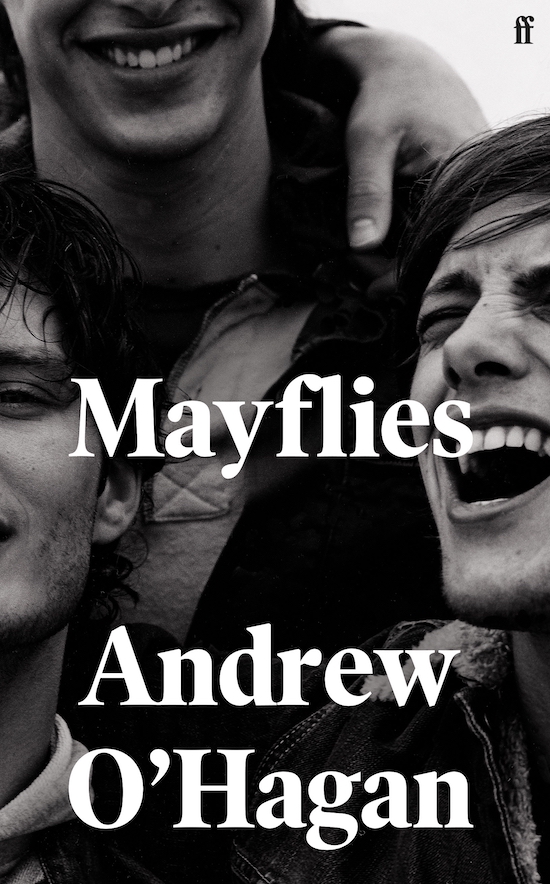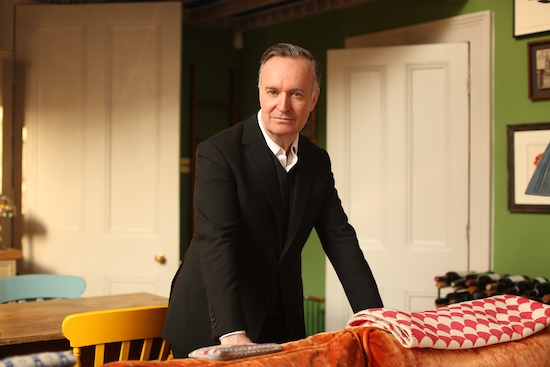East Kilbride, 1979: Ronnie Tulley, Eddie Thompson, Paul McCluskey, and yours truly swapping Talking Heads albums. We saw Josef K live with the band done up in face paint à la Brando’s Kurtz in Apocalypse Now! We nicked a drum stick from XTC’s Terry Chambers. You’re thinking: so what? Why am I telling you the humdrum everyday history of me and my old mates? Who gives a fig about a new town animal trying to escape his furnished cage? This was roughly my initial response to the first half of Mayflies, Andrew O’Hagan’s new novel. You’re sitting there thinking: who needs another damned dose of post-punk déjà vu?
Mayflies is a work of autofiction. The story is set in Irvine, another Scottish new town, with another set of Catholic lads straining at the leash. We see them on the lash, fuelled by cans of Tennent’s and bottles of Buckfast. This could be a nostalgic nightmare, the stuff of old Mojo articles and dusty memories of the Old Grey Whistle Test, fictional territory already strip-mined by Nick Hornby. But the halcyon memories of the novel’s first half, the essential frivolity and innocence of the boys, stand in starkly marked contrast to the novel’s harrowing conclusion. The latter section is utterly personal and devastating. No-one else could write this horror story.
Tully Dawson is James, the narrator’s, best friend. When he calls in the autumn of 2017, he’s succinct: “I’m fucked, man. Totally fucked. I didn’t want to tell you”. Tully has oesophageal cancer with metastasis and a four-month prognosis. Flashback to the summer of 1986 and the lads haven’t much of a care in the world. There’s difficulties with parents… but who hasn’t got those? Thatcher is a problem too; she’s roundly and correctly despised. James is smart, digs Jean Rhys and Norman Mailer. His English teacher is equally succinct in her prognosis: “You’re a weirdo and weirdos have to get out”. In time he will head south and become a writer. Tully is less focussed on work, more interested in play, and it’s his idea to make a pilgrimage to Manchester to see New Order, the Smiths, the Fall, and Magazine. Some bill…
The alternative (catching the Jesus and Mary Chain at the Barrowland) is dismissed on the grounds that they only play for fifteen minutes and are “neds”. This is an unfair dig at East Kilbride’s finest. Neither of the Reid brothers were (as far as I’m aware) in any of our local gangs, such as the Wild West or the Murray Mad Squad. O’Hagan’s period detail is otherwise sharply exact: the guys drink cans of Kestrel, chew on Curly Wurlys, scarf slices of frozen Arctic Roll. We are shown “mingin” Paisley hovels smelling of vinegar. Here, Jimmy and Tully puff on doobies with some other mates. They play air trumpet along to A Certain Ratio tapes and huddle in front of a two-bar electric fire. One of the team grabs a paintbrush and daubs Nag, Nag, Nag on the walls. Good times.
The pals idolise De Niro and Archie Gemmell. As young men they are dreamers, romantics. Jimmy notes, “we were as soft as Tunnock’s Teacakes, sentimental as sherbet”. Loyalty is all. There’s a brief encounter with the Smiths getting into a Rolls-Royce. A star struck Tully shouts: “Morrissey, ya fuckan bawbag”. One can see why Jimmy will stay true to his friend. Prior to the G-Mex festivities the lads catch the Shop Assistants at a “ratty school gym”. Tully heckles but the band get through their set with O’Hagan noting perfectly that they end playing “…in a soft meltdown of confidence. That was the habit of the day, the vital register, with those bands”.
At G-Mex they spy Mark E. Smith dressed in a school jumper, “gasping for England”. Soon, Mark is “ramping up the eff-offs”. O’Hagan pithily calls Smith “the Fine Fare Baudelaire”. After the gigs the gang gatecrash the Hacienda and get the DJ to play ‘Candyskin’ by the Fire Engines. The lads are clearly possessed of some taste. James/O’Hagan adds “and somewhere in heaven, in the comical blue or red or turquoise up there, it plays on”. Because in heaven everything is fine. At this precise moment Tully declares that he’s going to leave Irvine. He too plans his escape.

Fast forward thirty years and Tully, now a head teacher, is in the world of terminal care. Tully is direct in his needs and tells Jimmy/O’Hagan that he must not “let him die like a prick”. By this he means: “No mawkishness. No crowds round the bed. I hate the humiliation Jimmy. Get me out when things get bad”. Tully marries, endures chemotherapy and an oesophageal stent, takes a difficult trip to Sicily, but then all too soon heads for Zurich and an assisted death. Jimmy had previously promised to help organise “the final destination” of their friendship.
The last supper before the appointment with Dignitas is held in the splendour of the Kronenhalle where a Chagall and a Bonnard line the walls. Oysters, rack of lamb, a bottle of Chateau Chasse-Spleen 1990, as “loved by Lord Byron and Baudelaire”: we’re a long way away from caravan holidays at Seamill, Ally’s Tartan Army, and Killing Joke posters. Tully vomits up the lot. O’Hagan’s masterly account of the tortuous decision-making, the terrible reality of Tully’s action, and the more generalised issue of suffering (Tully’s wife, unsurprisingly, doesn’t want to lose him) should make even the surest critic of euthanasia take pause.
A friend in Zurich leaves Jimmy a present before Tully’s death: a rare book with engraved plates of Ephemeroptera – mayflies. Immature naïads morph into short-lived adult imagos. Ditto humans: immature nyaffs can occasionally turn into transient experts on Imagism. Aristotle and Dürer used mayflies as metaphor too; O’Hagan keeps classy company. From what seemed an eternity of youth marinading in fresh trivialities to that grinding halt in Switzerland. Hang on to your friends if and while you can. O’Hagan’s harrowing story reiterates the simple, albeit devastating message about life, the big one we get to know all too late in the day: it goes by way too fast.
Mayflies by Andrew O’Hagan is published by Faber and Faber


